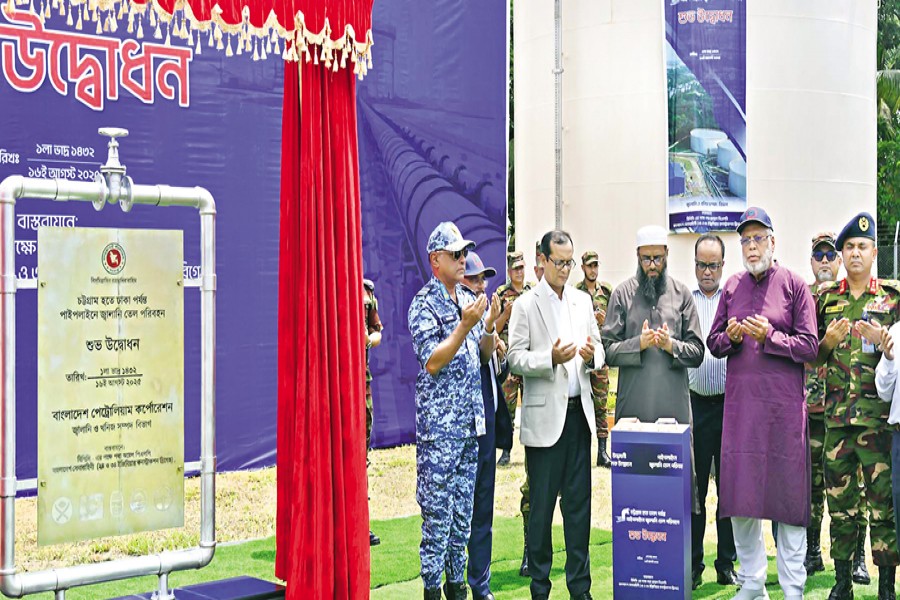
Published :
Updated :

The first ever Dhaka-Chattogram-Dhaka fuel oil transportation through a pipeline began on Saturday with inauguration of the newly-constructed Chattogram-Dhaka line on the day.
Energy Adviser Muhammad Fouzul Kabir Khan formally inaugurated the transportation through the pipeline at the Dispatch Terminal of Patenga in Chattogram on the day.
As a result, the country has entered into a new era of energy supply. The pipeline-based fuel oil supply will bring about a revolutionary change in the country's energy sector while saving billions annually.
Addressing the inauguration ceremony of the Chattogram-Dhaka pipeline fuel oil transportation project at the Dispatch Terminal of Patenga, Muhammad Fouzul Kabir Khan said, "We need to reduce waste and corruption, keeping in mind our limited resources. Another major problem in development is our high project costs. We can take any indicator, our road construction costs are the highest in South Asia. An even bigger problem is that there are many delays in project implementation. The project was also supposed to be completed in 2020. There was the coronavirus, the Russia and Ukraine war blamed for delaying the project. If the project is delayed, the cost will definitely increase. The price of equipment increases worldwide."
He said, "I am very happy that the Chattogram-Dhaka oil pipeline will transport fuel oil. This project of the state is related to technological progress. Technological progress is the basis of the modern world. We must remember that we do not have much wealth. We had some natural gas, but it is now running out. We have no significant natural resources other than human resources. In that case, we will have to move forward with technological improvements. Our resources are already limited, and we are not able to use what we have properly for two reasons. One is corruption, the other is waste. If we can reduce corruption and waste, and make technological progress, then growth achievement will be possible for a large population."
"Earlier, four-five people could bid for petroleum product imports. We have changed this, so now 10-12 companies can bid. So, now we have been able to save 1400-1500 crore taka annually," he added.
He said, "I would like to congratulate the Bangladesh Army for completing the difficult project. I hope that in future projects they will be cost-effective and complete them in the fastest time. Only by doing it in the fastest time it will be cost-effective."
He further said, "Our own value addition in any of our projects is very low. If we cannot increase our own value addition in the coming days, we will face challenges. We will have to reduce our dependence on contractors from other countries."
The inaugural function was chaired by Chairman of Bangladesh Petroleum Corporation (BPC) Md. Amin Ul Ahsan. Secretary of the Energy and Mineral Resources Ministry Mohammad Saiful Islam and Engineer-in-Chief of the Bangladesh Army Major General Md. Hasan-Uz-Zaman addressed the function as special guests. BPC Director Dr. AKM Azadur Rahman delivered the welcome speech.
Sources said the Chattogram-Dhaka oil pipeline, Bangladesh's first ever pipeline to transport oil, was implemented aiming to save time, reduce transportation costs, and lower system losses and environmental pollution. The total cost of the project was Taka 3,600 crore. The pipeline, capable of transporting 30 lakh MT of fuel oil annually, will save Taka150 crore in transportation costs annually. BPC implemented the project through the 24 Engineering Construction Brigade of Bangladesh Army.
The pipeline was planned in 2015, with the government aiming to complete it by 2017, intending to reduce transportation costs and prevent theft. BPC also initiated a feasibility study and enlisted Engineers India Limited as consultants at the same time. Following the study, a policy decision was made to proceed with the project.
Executive Committee of the National Economic Council (ECNEC) approved the pipeline project, titled "Supply of Fuel Oil in the Pipeline from Chattogram to Dhaka", with an initial budget of Taka 2,861.31 crore in October 2018. The Chattogram-Dhaka oil pipeline was designed to transport 27-30 lakh MT of fuel annually, with a future capacity increase of 50 lakh MT.
The 250 km long pipeline from Chattogram to Dhaka will transport over 27 lakh MT of diesel (High Speed Diesel-HSD). HSD is one of the most important fuels for agricultural works in the northern districts of the country. Under the project, a total of 241.28 kilometres of the pipeline was installed from Guptakhal in Patenga to Godnail in Narayanganj, passing through Feni, Cumilla, Chandpur, and Munshiganj. The entire pipeline is protected by a three-layer extruded polyethene coating. The pipeline route has traversed the beds of 22 rivers and canals, with nine stations along the way, and a new fuel depot already established in Cumilla's Barura upazila.
The BPC imports nearly 1.3 million MT of crude oil and 4.2 million MT of refined oil. Dhaka and its adjacent areas consume nearly 1.5 million MT of oil a year. Besides, different natural gas fields and private fractionation plants supply around 0.30 million MT of petroleum products. From Godnail and Fatullah in Narayanganj, oil tankers usually transport oil through waterways to the depots in the country's northern areas including Baghabari (Pabna), Chilmari (Kurigram) and north-eastern Chachna Bazar (Sunamganj).
nazimuddinshyamol@gmail.com


 For all latest news, follow The Financial Express Google News channel.
For all latest news, follow The Financial Express Google News channel.